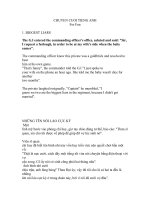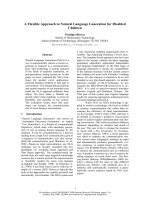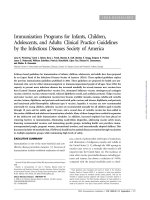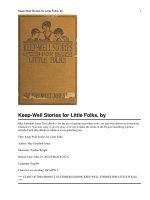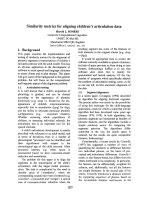stories for thinking children 2
Bạn đang xem bản rút gọn của tài liệu. Xem và tải ngay bản đầy đủ của tài liệu tại đây (4.66 MB, 125 trang )
ABOUT THE AUTHOR
The author, who writes under the pen-name
Harun Yahya, was born in Ankara in 1956. He
studied arts at Istanbul's Mimar Sinan University,
and philosophy at Istanbul University. Since the
1980s, the author has published many books on
political, faith-related and scientific issues. Greatly
appreciated all around the world, these works
have been instrumental in helping many to return their faith in Allah,
and, in many others, to gain a deeper insight into their faith. Harun
Yahya's books appeal to all kinds of readers, regardless of their age,
race, or nationality, for they focus on one objective: to broaden the
reader's perspective by encouraging him or her to think about a
number of critical issues, such as the existence of Allah and His unity,
and to live by the values He prescribed for them.
CC
hildren! What do you know about termites,
those hard-working creatures resembling
ants? Do you know that butterflies with their
beautiful wings start out as tiny caterpillars and
finally emerge from cocoons?
Do you know how woodpeckers hide tiny acorns in holes in
oak trees, how it is that glow-worms are not burned by the
light they give off, how frogs camouflage themselves to hide
from their enemies, or how it is that seals do not freeze in the
icy oceans ?
The stories you read in this book will give you lots of facts
about those and many other fascinating subjects. As you read
these stories you will think in detail about the animals in them
and see just how flawlessly Allah has created them all.
in Ankara in 1956. Having completed his primary and secondary edu-
cation in Ankara, he studied arts at Istanbul's Mimar Sinan University
and philosophy at Istanbul University. Since the 1980s, he has pub-
lished many books on political, scientific, and faith-related issues.
Harun Yahya is well-known as the author of important works disclos-
ing the imposture of evolutionists, their invalid claims, and the dark li-
aisons between Darwinism and such bloody ideologies as fascism and
communism.
His pen-name is a composite of the names Harun (Aaron) and Yahya
(John), in memory of the two esteemed Prophets who fought against
their people's lack of faith. The Prophet's seal on the his books' covers
is symbolic and is linked to the their contents. It represents the Qur'an
(the final scripture) and the Prophet Muhammad (peace be upon him),
last of the prophets. Under the guidance of the Qur'an and the Sunnah
(teachings of the Prophet), the author makes it his purpose to disprove
each fundamental tenet of godless ideologies and to have the "last
word," so as to completely silence the objections raised against religion.
He uses the seal of the final Prophet, who attained ultimate wisdom
and moral perfection, as a sign of his intention to offer the last word.
All of Harun Yahya's works share one single goal: to convey the Qur'
an's message, encourage readers to consider basic faith-related issues
such as Allah's Existence and Unity and the hereafter; and to expose
godless systems' feeble foundations and perverted ideologies.
Harun Yahya enjoys a wide readership in many countries, from India
to America, England to Indonesia, Poland to Bosnia, and Spain to
Brazil. Some of his books are available in English, French, German,
Spanish, Italian, Portuguese, Urdu, Arabic, Albanian, Russian, Serbo-
Croat (Bosnian), Polish, Malay, Uygur Turkish, and Indonesian.
Greatly appreciated all around the world, these works have been in-
strumental in many people recovering faith in Allah and gaining
deeper insights into their faith. His books' wisdom and sincerity, to-
gether with a distinct style that's easy to understand, directly affect
anyone who reads them. Those who seriously consider these books,
can no longer advocate atheism or any other perverted ideology or ma-
terialistic philosophy, since these books are characterized by rapid ef-
fectiveness, definite results, and irrefutability. Even if they continue to
do so, it will be only a sentimental insistence, since these books refute
such ideologies from their very foundations. All contemporary move-
ments of denial are now ideologically defeated, thanks to the books
written by Harun Yahya.
This is no doubt a result of the Qur'an's wisdom and lucidity. The au-
thor modestly intends to serve as a means in humanity's search for
Allah's right path. No material gain is sought in the publication of these
works.
Those who encourage others to read these books, to open their
minds and hearts and guide them to become more devoted servants of
Allah, render an invaluable service.
Meanwhile, it would only be a waste of time and energy to propa-
gate other books that create confusion in people's minds, lead them into
ideological chaos, and that clearly have no strong and precise effects in
removing the doubts in people's hearts, as also verified from previous
experience. It is impossible for books devised to emphasize the author's
literary power rather than the noble goal of saving people from loss of
faith, to have such a great effect. Those who doubt this can readily see
that the sole aim of Harun Yahya's books is to overcome disbelief and
to disseminate the Qur'an's moral values. The success and impact of
this service are manifested in the readers' conviction.
One point should be kept in mind: The main reason for the continu-
ing cruelty, conflict, and other ordeals endured by the vast majority of
people is the ideological prevalence of disbelief. This can be ended only
with the ideological defeat of disbelief and by conveying the wonders
of creation and Qur'anic morality so that people can live by it.
Considering the state of the world today, leading into a downward spi-
ral of violence, corruption and conflict, clearly this service must be pro-
vided speedily and effectively, or it may be too late.
In this effort, the books of Harun Yahya assume a leading role. By the
will of Allah, these books will be a means through which people in the
twentyfirst century will attain the peace, justice, and happiness
promised in the Qur'an.
•
A special chapter is assigned to the collapse of the theory of evolution
because this theory constitutes the basis of all anti-spiritual philosophies. Since
Darwinism rejects the fact of creation—and therefore, Allah's Existence—over
the last 140 years it has caused many people to abandon their faith or fall into
doubt. It is therefore an imperative service, a very important duty to show
everyone that this theory is a deception. Since some readers may find the
chance to read only one of our book, we think it appropriate to devote a chap-
ter to summarize this subject.
• All the author's books explain faith-related issues in light of Qur'anic
verses, and invite readers to learn Allah's words and to live by them. All the
subjects concerning Allah's verses are explained so as to leave no doubt or
room for questions in the reader's mind. The books' sincere, plain, and fluent
style ensure that everyone of every age and from every social group can easily
understand them. Thanks to their effective, lucid narrative, they can be read at
a one sitting. Even those who rigorously reject spirituality are influenced by the
facts these books document and cannot refute the truthfulness of their contents.
• This and all the other books by the author can be read individually, or
discussed in a group. Readers eager to profit from the books will find discus-
sion very useful, letting them relate their reflections and experiences to one an-
other.
• In addition, it will be a great service to Islam to contribute to the publi-
cation and reading of these books, written solely for the pleasure of Allah. The
author's books are all extremely convincing. For this reason, to communicate
true religion to others, one of the most effective methods is encouraging them
to read these books.
• We hope the reader will look through the reviews of his other books at
the back of this book. His rich source material on faith-related issues is very use-
ful, and a pleasure to read.
• In these books, unlike some other books, you will not find the author's
personal views, explanations based on dubious sources, styles that are unob-
servant of the respect and reverence due to sacred subjects, nor hopeless, pes-
simistic arguments that create doubts in the mind and deviations in the heart.
HHAARRUUNN YYAAHHYYAA
Say Your Prayers Before
Prayers Are Said For You
Khatoons Inc.
Publishers and Distributors of Islamic Books
6650 Autumn Wind Circle
Clarksville, Maryland 21029 USA
Phone: (410) 531-9653
1 800 667-7884
e-mail:
Printed by: SECIL OFSET - December 2003
100 Yil Mahallesi MAS-SIT Matbaacilar Sitesi
4. Cadde No: 77 Bagcilar-Istanbul
Tél: +90 212 629 06 15
www.harunyahya.com
FFaarruuqq aanndd tthhee TTeerrmmiitteess 88
AAssaadd aanndd tthhee CCoolloorrffuull BBuutttteerrfflliieess 1100
TThhee WWooooddppeecckkeerr aanndd IIrrffaann 1144
JJaallaall aanndd tthhee SSeeaagguullll 1166
KKaammaall aanndd tthhee GGllooww wwoorrmm 1166
AAhhmmaadd aanndd tthhee GGrreeeenn FFrroogg 2244
HHaammeeeedd aanndd tthhee LLoonngg LLeeggggeedd SSttoorrkk 2288
NNaabbeeeell aanndd tthhee SSeeaall 3322
AAmmiirr aanndd tthhee CChhaammeelleeoonn 3366
TTaarriiqq aanndd tthhee DDoogg 4400
FFaarrhhaann aanndd tthhee HHoorrssee 4444
AAnnttaarr aanndd tthhee KKaannggaarroooo 4488
ZZaakkii aanndd tthhee SSppiiddeerr 5522
FFaarrooooqq aanndd tthhee DDuucckk 5544
AAllii aanndd tthhee OOssttrriicchh 5588
KKaasshhiiff aanndd tthhee HHoonneeyy LLoovviinngg BBeeaarr 6622
AAiisshhaa aanndd tthhee PPoorrccuuppiinnee 6666
MMaannssoooorr aanndd tthhee GGiiaanntt PPoollaarr BBeeaarrss 7700
OOmmaarr aanndd tthhee FFiisshh 8800
RRaasshhaadd aanndd TTaawwffiiqq 9900
AAppppeennddiixx:: TThhee DDeecceeppttiioonn ooff EEvvoolluuttiioonn 9922
II
t was a bright, sunny Sunday. Faruq had gone to the forest for
a picnic with his teacher and his classmates.
Faruq and his friends began playing hide and seek.
Suddenly Faruq heard a voice crying, "Be careful!" Faruq
began looking to right and left, unsure of where the voice was
coming from. But there was nobody there.
Later on he heard the same voice again. This time it said, "I'm
down here!"
Right next to his foot Faruq noticed an insect that looked very
much like an ant.
"Who are you?" he asked.
"I'm a termite," the tiny creature replied.
"I never heard of a creature called a termite," mused Faruq
"Do you live alone?"
"No," replied the insect, "We live in nests in big groups. If you
88
like I'll show you one."
Faruq agreed, and they moved off. When they ar-
rived, what the termite showed Faruq looked like a tall
building with windows in it.
"What's this?" Faruq wanted to know.
"This is our home," the termite explained "We build
these ourselves."
"But you are so small," objected Faruq. "If your
friends are all the same size as you, how can you pos-
sibly make something as enormous as this?"
The termite smiled. "You're right to be surprised, Faruq. For lit-
tle creatures like us to be able to make places like this really is very
surprising. But don't forget, this is easy for Allah, Who created us
all."
"What is more, besides being very tall, our homes have other
very special features to them as well. For example, we make spe-
cial children's rooms, places for growing mushrooms and a
queen's throne room for our homes. And we don't forget to make
a ventilation system for our homes. By doing this we balance the
humidity and temperature inside. And before I forget, let me tell
you something else, Faruq, we are unable to see!"
Faruq was amazed "Although you are so tiny you can hardly
be seen, you still build homes just like the tall buildings people
make. How do you manage to do all this?"
The termite smiled again "As I said before, it is Allah Who
gives us these extraordinary talents. He created us in such a way
that we are able to do all these things. But now Faruq, I must go
back home and help my friends."
Faruq understood: "OK, I want to go and tell my teacher and
my friends what I've learned about you right away."
"Good idea, Faruq" waved the little termite, "Look after your-
self. Hope to see you again."
99
AA
t the weekend, Asad went to visit his grandfather.
The two days passed very quickly, and before
Asad knew it his father had arrived to take him home.
Asad said goodbye to his grandfather and went to sit in
the car. He was looking out of the window as he waited for
his father to collect his things. A butterfly sitting on a
flower a short distance away fluttered its wings and flew
to the car window.
"You're going home, aren't you, Asad?" asked the but-
terfly in a tiny voice.
Asad was astonished "Do you know me?" he asked.
"Of course I do," smiled the butterfly. "I've heard your
grandfather telling the neighbors about you."
"Why didn't you come and talk to me before?" Asad
inquired.
"I couldn't, because I was in a cocoon up a tree in the
garden," explained the butterfly.
1100
"A co-
coon? What's
that?" asked Asad, who
was always a curious boy.
"Let me explain from the be-
ginning," said the butterfly as it
took a deep breath. "We but-
terflies hatch out of the egg as
tiny caterpillars. We feed our-
selves by nibbling
leaves. Later we
use a liquid which
comes out of our
bodies like thread
and wrap ourselves
up in it. That little
package we weave is called
a cocoon. We spend a while inside
that package as we wait to grow.
When we wake up and come
out of the cocoon we have
brightly colored wings. We spend
the rest of our lives flying and feed-
ing ourselves from flowers."
Asad nodded thoughtfully "You
mean all those colorful butterflies
were once caterpillars before they
grew wings?"
1111
Everything
in the heavens
and the earth
glorifies Allah
(Surat al-Hadid, 1)
"Can you see the green caterpillar on that branch?"
asked the butterfly.
"Yes, I see it. It's nibbling away hungrily at a leaf."
"That's my little brother," smiled the cater-
pillar "In a while he'll weave a cocoon too,
and one day he'll be a butterfly like me."
Asad had lots of questions to ask his
new friend. "How do you plan this
change? I mean, when do you come out of
the egg, how long do you stay as a cater-
pillar and how do you make the thread to
weave your cocoons?"
1122
Do you not see that Allah sends down
water from the sky and by it We bring
forth fruits of varying colors? And in the
mountains there are streaks of white
and red, of varying shades, and rocks of
deep jet black. And mankind and beasts
and livestock are likewise of varying
colors. Only those of His servants with
knowledge have fear of Allah. Allah is
Almighty, Ever-Forgiving.
(Surah Fatir: 27-28)
"I don't plan any of it at
all," explained the butterfly
patiently. "Allah has taught us
what we need to do and when we
need to do it. We just act in the way our
Lord wills."
Asad was really impressed. "The patterns on
your wings are wonderful. And all butterflies have
different patterns, don't they? They are really color-
ful and eye-catching!"
"That's a proof of Allah's incomparable artistry. He created us one
by one in the most beautiful way possible," explained his friend.
Asad agreed enthusiastically: "It's impos-
sible not to see the beautiful things
Allah has created. There are hun-
dreds of examples all round us!"
The butterfly agreed: "You're
right Asad. We need to give
thanks to Allah for all these
blessings."
Asad looked over his shoul-
der: "My father's coming. It
looks like we're about to set
off. It was really great to
meet you. Can we talk
again when I come next
week?"
"Of course," nodded
the butterfly. "Have
a safe journey
home."
1133
TT
hat Sunday, Irfan went for a walk in the woods with his father.
While he was walking, he was thinking about how beautiful the
trees and all of nature were. His father then bumped into a friend, and
as the two grown-ups were chatting Irfan heard a sound:
Tap, tap, tap, tap, tap, tap
The sound was coming from a tree.
Irfan walked up to the bird that was mak-
ing it and asked:
"Why are you hitting the tree with
your beak like that?"
The bird stopped what it was doing,
and turned to look at Irfan. "I am a
woodpecker, " it answered. "We make
holes in trees and build our nests in them.
Sometimes we store our food in these
tree holes. This is the first hole I've ever
made. I will make hundreds more like it
though." Irfan looked closer at the hole.
"Fine, but how do you store food in such
a small place?" he wondered.
"Woodpeckers mostly eat acorns, and acorns are quite small," the
woodpecker explained. "Inside each hole I make I'll put one acorn.
That way I'll be able to store enough food for myself."
Irfan was puzzled: "But instead of struggling with lots of small
holes," he said, "you could make one big one and store all your food
1144
there."
The woodpecker smiled: "If I did that, other birds would come and
find my food store and steal my acorns. But the holes I make are of
different sizes. When I put the acorns I find into the holes, I store them
according to their size. The size of the acorn exactly matches the hole
I put it into. That way the acorn fits tightly into the hole. Because Allah
created my beak so that I can take the acorns back out of the holes
easily, I can take them from the trees without any problem. But other
birds can't do that, so my food is safe. Of course, I don't have the
brains to think all that out. I'm only a woodpecker. Allah makes me
do these things. It is Allah Who taught me how to hide my food and
Who created my beak in
the right way for me to do
it. Really, it isn't just me—
all living creatures are
able to do the things they
do because that is what
Allah taught them."
Irfan agreed: "You're
right. Thank you for telling
me all that You re-
minded me the great
power of Allah."
Irfan said goodbye to
his little friend and went
back to his father. He was
very happy because wher-
ever he looked he could
see another of Allah's mir-
acles.
1155
WW
hen he was traveling by ferryboat in hot
weather what Jalal liked to do best was to
sit outside on deck. That way he got a closer view
of the sea and could look around more easily.
One day Jalal boarded the ferryboat with his
mother. Right away he went and sat down on
deck. A group of seagulls were following the
ferryboat as though they were racing one an-
other. The seagulls put on a wonderful display,
swirling and turning in the air, and fought one
another over pieces of bread thrown to them by
the passengers.
One of the seagulls glided slowly down
and landed on the seat next to Jalal.
"How did you like our flying display?" it
asked. "I noticed that you were watching us
very carefully. What's your name?"
"My name's Jalal. Yes, I was really enjoy-
ing watching you flying. I see you can stay up
in the air without flapping your wings at all.
How do you do that?"
1166
The seagull nodded its head. "We seagulls position ourselves
according to the direction of the wind. Even if there is very little
wind, rising air currents lift us up. We make use of this
movement, and we can make long journeys without flap-
ping our wings at all."
"We move backwards and forwards inside the masses
of air rising up from the sea," it went on. "These currents
mean that we always have air under our wings,
and that allows us to stay up in the air without
using up too much energy."
Jalal was still not sure he quite understood: "I saw you up there
in the air without moving your wings, just as if you were hanging
there. And you do all this by acting according to the direction of
the wind? I can see that, but how do you calculate the strength of
the wind and which direction it will come from?"
"It's impossible for us to do that from our own knowledge,"
began the seagull. "When He created us Allah taught us how to fly
and how to hang in the air without wasting energy. These are ex-
amples given us so that we can realize Allah's existence and un-
derstand His power."
Jalal thought of another question: "Yes, you stay hanging in the
air as though you were held up there by a string To be able to
do this you'd need to know math very well and be able to make
detailed calculations, but you do it without any problem right from
the first time you fly, don't you?"
"Absolutely," the seagull agreed. "Our Lord gave every living
1177
creature the inspiration it needs. We all do what we are told to do.
Never forget that Allah embraces everything and keeps everything
under His control. He is the Lord of all things. You can find a lot of
verses about this in the Qur'an. The ferry is approaching land now,
and I'm going to fly off to join my friends. See you again " Jalal
watched his new friend fly away, growing smaller and smaller in the
distance.
When he arrived home Jalal looked for a verse in the Qur'an
about everything being under Allah's control. He found it in the
Surah Hud, and learned the verse by heart right away:
[Hud said,] "I have put my trust in Allah, my Lord and your Lord.
There is no creature He does not hold by the forelock. My Lord
is on a Straight Path." (Surah Hud: 56)
1188
Do they not see the birds
suspended in mid-air up in the sky?
Nothing holds them there except Allah.
There are certainly Signs in that for
people who believe.
(Surat an-Nahl: 79)
1199
DD
DD
ear children, have you heard of a kind of bird known as
megapode? When these birds have chicks to raise, it is
always the male birds which look after them. First the
mother bird digs a big hole to lay her eggs in. After she has laid
her eggs, the male has to keep the nest at a temperature of 92
degrees Fahrenheit (3 degrees Celsius).
In order measure the temperature of the nest the male bird buries
its beak in the sand which covers it, using its beak like a ther-
mometer. The bird repeats this operation over and over again. If
the temperature of the nest goes up, it immediately opens air
holes to bring the temperature down again. Also, the bird's beak
is such a delicate thermometer that if somebody throws a handful
of soil on top of the nest and the temperature rises even the tini-
est bit, the bird can detect this. Such measurements are only pos-
sible for us to make by using a ther-
mometer, and yet megapodes have
been doing this for centuries, and
never make the slightest mistake.
This is because Allah taught them
everything, and it is the Almighty
Allah Who created a beak with the
sensitivity of a thermometer.
OO
n summer evenings Kamal and his family used to eat their
evening meals in the garden. One summer evening, as they
were getting up from the table, Kamal saw a light going on and off
amongst the trees at the edge of the garden. He went over to the
trees to see what was going on, and he noticed an insect flitting
about. But this insect was very different from those he was used to
seeing in the daytime. It was giving off light as it flew.
The insect stopped flying for a moment, and came up to Kamal.
"Hello," it said. "You look very surprised. You've been watching
me for a long time. My name's Glow-Worm, what's yours?"
"My name's Kamal. You're right, I've never seen an insect that
flickered with light in the way you do before. Yellowish green rays
are coming from your body. I remember that once when I touched
a light bulb it burned my hand. Doesn't having this light coming
from your body hurt you?"
The glow-worm nodded. "You're right,
Kamal, when you say that lamps are
really very hot while giving off light.
Light bulbs use electrical energy to
produce light, and some of that en-
ergy turns into heat. That causes
the bulb to become hot. But we do
not take energy from outside for
the light that our bodies give off."
Kamal thought he understood.
2200
"So does that mean you don't get hot?" he asked.
"That's right," agreed the glow-worm. "We pro-
duce energy ourselves and we use this energy very care-
fully. That means that none of our energy is wasted and it
doesn't produce heat which would damage our bodies."
Kamal considered for a moment, "That's a really well thought
out system."
"Yes, it is," agreed his friend. "When Allah created us He
planned everything we need in the best possi-
ble way. When we're flying we beat our
wings very quickly. Of course, that's a
job which needs a lot of energy. But
because our light doesn't use up much
of our energy we have no problem
with it."
Kamal had something else he
wanted to ask, "What do you use the
light you give off for?"
His friend ex-
plained: "We use it
both to pass mes-
sages amongst
ourselves and to
defend our-
selves. When we
want to say something
to one another we
talk by flickering our
2211
lights. At other times we use it to frighten our enemies and keep
them away from us."
Kamal was very impressed by what his friend had
been telling him: "So everything you need is inside your
own bodies, and there's no need to tire yourselves out!"
"That's right," the glow-worm agreed. "Despite all their
best efforts, scientists have been unable to develop a system
quite like ours. As I said before, Allah created us in the most
beautiful way and in the way most suited to our needs, just like all
other living things."
Kamal smiled. "Thank you. What you have told me is very in-
teresting. I now realize what the verse I read yesterday means,
''IIss
HHee WWhhoo ccrreeaatteess lliikkee hhiimm wwhhoo ddooeess nnoott ccrreeaattee?? SSoo wwiillll yyoouu nnoott ppaayy
hheeeedd??''
(Surat an-Nahl: 17) When you think of all the living things
Allah created and ourselves, there are plenty of examples to take
heed of!!"
2222
He is Allah—the Creator, the
Maker, the Giver of Form. To Him
belong the Most Beautiful Names.
Everything in the heavens and
earth glorifies Him. He is the
Almighty, the All-Wise. (Surat al-
Hashr: 24)
"Yes Kamal, every living thing is a proof of the superior
creative art of Allah. Now, whenever you look at anything, you
will be able to see this. Now I should go. But don't forget what we
have been talking about!"
Kamal waved his friend goodbye: "It was nice to have met
you. Hope to see you again "
On the way to home, reflecting on the amazing design in the
glow-worm, Kamal was eager to tell his family about his conver-
sation with his little friend.
2233
The Red Sea lies be-
tween two deserts. No rivers or
other running fresh water drain into
it. In other words, there is no transfer
of oxygen or nitrogen. Normally this
sea would be a barren desert like the
lands which surround it, yet it con-
tains corals of all kinds. The corals
which manage to live here in spite of
the difficult conditions are able to do
so because of the symbiosis (the way
they live together with other living
things) they have established with other crea-
tures resembling plants, called algae. The
algae hide themselves from their ene-
mies within the coral reefs and use sun-
light to perform photosynthesis. The
harmonious lifestyle of these two creatures
is yet another proof of Allah's won-
drous creation.
